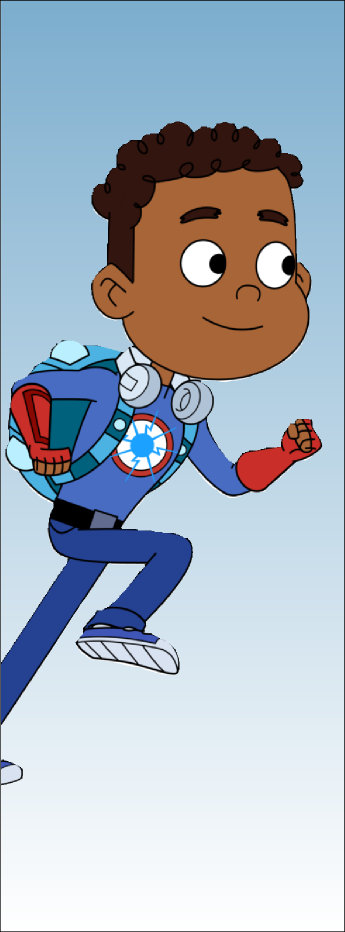AJ is accepted and actually appreciated for the unique positives he brings to the table.
As a parent of a teenager on the spectrum, and someone who has become extremely sensitive to how special needs are represented in media, I can confidently say, boy, have we come a long way!

meet "Autism Daddy"
BY FRANK CAMPAGNA
As the father of a now 16-year-old with non-verbal autism and epilepsy, I used to struggle to find characters in mainstream media that my child could relate to. My son was born in 2003 and was diagnosed with autism in 2005. At that time, there were not many accurate representations of autism. The only representation for me growing up was Dustin Hoffman in Rain Man, and that story did not speak to my reality or my son's reality.
When social media became popular, all I could find out there were mommy-bloggers writing about how great everything was and friends sharing viral videos about special needs kids having amazing talents or stories about neurotypical adults doing nice things for special needs kids.
That is why back in 2011, when my son was 8 years old, I started writing about my experience as a special needs parent and doing public speaking as "Autism Daddy." I felt like there was no one out there writing about the realities of raising a kid on the spectrum. I started writing daily about what life is like in my household. I didn't write "miracle" stories or "horrible" stories. Mostly, I wrote about the mundane stuff. My kid was obsessed with microwave popcorn. My son is also a great swimmer. My writing eventually developed into a blog about a dad raising a son who also happens to have autism.
As television and film have evolved, stories of children with special needs have become more prevalent. And I'm proud to say I was involved in moving the needle forward, not once, but twice. I'm a producer on Sesame Street and worked closely on their autism initiative, "See Amazing in All Children," and now there's a new show on the block that I've been consulting on. I'm also excited to see autism incorporated into the cartoon and superhero world with the creation of Hero Elementary.
That's right, a new educational animated series, Hero Elementary, launches June 1st on PBS KIDS. Children across the United States will be introduced to AJ Gadgets, a main character of the series who is on the autism spectrum. The show is co-produced by Twin Cities PBS and Portfolio Entertainment. It aims to spark a love of science in children ages four to seven. The series is described in its press release as, "A school for budding superheroes, where kids learn to master their innate powers, like flying and teleportation, while exploring science along the way." Hero Elementary centers around the Sparks Crew, which includes "Lucita Sky, an empathetic natural leader with the power to fly – and a fear of heights; AJ Gadgets, a superhero who is passionate about all things super, has the ability of thought projection, makes super gadgets – and who also happens to be on the autism spectrum; Sara Snap, who's tiny, but mighty, with super strength and the power to teleport; and Benny Bubbles, a loyal and protective animal lover with a heart of gold, who can create amazing bubbles that double as forcefields. The Sparks Crew is led by their quirky and enthusiastic teacher, Mr. Sparks. Both Mr. Sparks and Lucita are bilingual Spanish/English speakers. Rounding out the Crew is Fur Blur, the class hamster with an epic appetite and super speed."
Did you catch that? One of the major characters in this new series is a kid with autism! And it's basically stated as an afterthought. It's not the focus of the press release. The fact that a major character in a new children's series has special needs, but is represented as just one of the crew, is a necessary step in the right direction. In my humble opinion, that is huge progress in the world of special needs.
Carol-Lynn Parente and Christine Ferraro are behind this groundbreaking series. These two women were instrumental in launching Sesame Street's autism initiative, "See Amazing in All Children," back in 2015, and Christine wrote many of the scripts that feature Julia, Sesame Street's muppet character with autism. In 2014, when Sesame Street started working on its own autism initiative, I thought, "Finally, we will have an accurate representation of autism out there in the mainstream media, and I get to play a small part in shaping the narrative." I was so proud to be an autism parent and also get to work on an autism initiative aimed at kids. In the end, Sesame's representation of autism has received rave reviews over the years and Julia has become a semi-regular character on Sesame and an icon within the autism community. So, I was thrilled when Carol-Lynn and Christine reached out to tell me they were working on a new show featuring a character with autism. I became a consultant for the show and began review ing scripts to ensure that autism was being portrayed accurately, and AJ, the character with autism, was a good representation of a high- functioning kid on the spectrum.
For the past two years, I've read over 80 scripts. I can attest that this is a great show. As a nerdy kid who was a teenager in the 1980s, I love anything related to superheroes. I can't wait to start watching this show with my son. After reading every script carefully, I can proudly say that the character with autism is truly just one of the crew who also happens to have autism. AJ Gadgets flaps his hands when he's anxious, wears noise-canceling headphones sometimes and doesn't like it when his clothes get wet. He has his quirks, but his friends accept him for who he is. So, most of my notes and feedback to the producers on the scripts centered on how the other characters reacted when AJ had his moments. I wanted his friends to be supportive, but to never come across as patronizing.
When looking across the whole series, that is exactly what we got. In fact, the strongest thing about AJ is that his autism is not his superpower, nor is it the focus of every script. In fact, it's rarely mentioned throughout the series. AJ Gadgets is African-American, which was a conscious decision by the creative team because research shows that African-American kids on the spectrum are often diagnosed much later than their peers. The hope is that AJ could open the door to an earlier diagnosis for other kids with autism.
Throughout this whole process, I was impressed with the way autism and AJ were represented. I asked the show creators how they worked AJ and his autism so skillfully into the series and Carol-Lynn explained, "We didn't set out to create a character on the spectrum. We created the character AJ, and from our research on creating Julia for Sesame Street, we knew that the description of AJ could be a kid on the spectrum. Having a character with autism on TV is, thankfully, more common today, but not as a lead character… and, of course, AJ is a superhero to boot! We hope that modeling how autism manifests in AJ will help build an understanding of people on the spectrum and lead to more acceptance and inclusion."
Christine Ferraro added, "To me, one of the strengths of the way we treat AJ's autism on the show is that we don't make a big deal about it. AJ is high-functioning and has mannerisms, sensitivities and interests that show he has autism, but they are not usually pointed out or the center of focus. People who are "in the know" and are familiar with autism will recognize these attributes, while others might just see AJ as a quirky kid. We do have a special double episode in which AJ's autism is discussed explicitly, in a positive context. But for most of the episodes, his autism is just a part of who he is: a valuable member of the team and a friend everyone cares about. To me, that stands out as different from the way autism is portrayed on other shows."
This subtle, but powerful message will help shift the autism narrative in mainstream media. The message being that AJ is accepted and actually appreciated for the unique positives he brings to the table. As a parent of a teenager on the spectrum, and someone who has become extremely sensitive to how special needs are represented in media, I can confidently say, Boy, have we come a long way!

Hero Elementary is set within a school of young superheroes learning to master their unique abilities while taking on some day-saving action. The show features doses of humor, adventure and learning, brought about from the same kinds of challenges children face in their everyday lives. The students of Hero Elementary are at the stage of their lives where the whole world is unfolding and there are tons of exciting discoveries to be made. The series features AJ Gadgets, an autistic character who is a lead member of the group and contributes to the adventures just as equally as the rest of the crew. The goal of the show is to promote inclusiveness, teamwork and the idea that everyone has the ability to contribute when given the opportunity. Autism is a common condition that many young children will experience through interactions with schoolmates and others in their daily lives, and this series is a perfect platform to help do away with some of the stigma associated with it. — Courtesy pbs.org
ABOUT THE AUTHOR:

Frank Campagna, "Autism Daddy," is the father to a 16-year-old son with autism and epilepsy. He is a social media sensation whose blog and Facebook page give a non-sugar-coated look at the world inside an autism household. Frank has worked at Sesame Street for the past 25 years, including the autism initiative, Sesame Street & Autism: See Amazing in All Children.